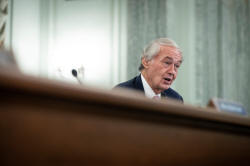|
Senators Richard Blumenthal and Ed Markey, both Democrats,
called for the passage of an update of the 1998 Children's
Online Privacy Protection Act (COPPA), which would, among other
things, raise the age of children whose data cannot be collected
without consent from 12 to 15.
They also urged the passage of legislation that would ban
auto-play settings and push alerts designed to pull users onto
an app and then keep them there.
"Whether your name is Facebook, YouTube, TikTok or Snapchat,
these platforms all seem to operate on the same computer code of
misconduct, endangering kids and teens," said Markey. "Big Tech
has lost trust."
Blumenthal called for the measures to be passed within months.
The lawmakers have expressed concern about children and
teenagers being shown content that they say sometimes encourages
dangerous behavior, eating disorders or other kinds of
self-harm.
Markey was the House author of the 1998 Children's Online
Privacy Protection Act (COPPA).
Facebook and TikTok did not immediately respond to a request for
comment. Google's YouTube declined comment.
A Snap Inc spokesperson said the company "built critical safety
protections directly into Snapchat's architecture and products,
and are constantly working to strengthen our efforts." The
company, the person said, supports "thoughtful regulation."
In a hearing Tuesday, executives for TikTok, Snapchat and
YouTube said that they sought to create fun, safe online
experiences for kids and to exclude dangerous or unsavory
content.
(Reporting by Diane Bartz; Editing by David Gregorio)
[© 2021 Thomson Reuters. All rights
reserved.] Copyright 2021 Reuters. All rights reserved. This material may not be published,
broadcast, rewritten or redistributed.
Thompson Reuters is solely responsible for this content.

|
|





